2023年河南省人教新目标(Go for it)版中考英语二轮专题复习:专项2 冠词(共36张ppt)
文档属性
| 名称 | 2023年河南省人教新目标(Go for it)版中考英语二轮专题复习:专项2 冠词(共36张ppt) | 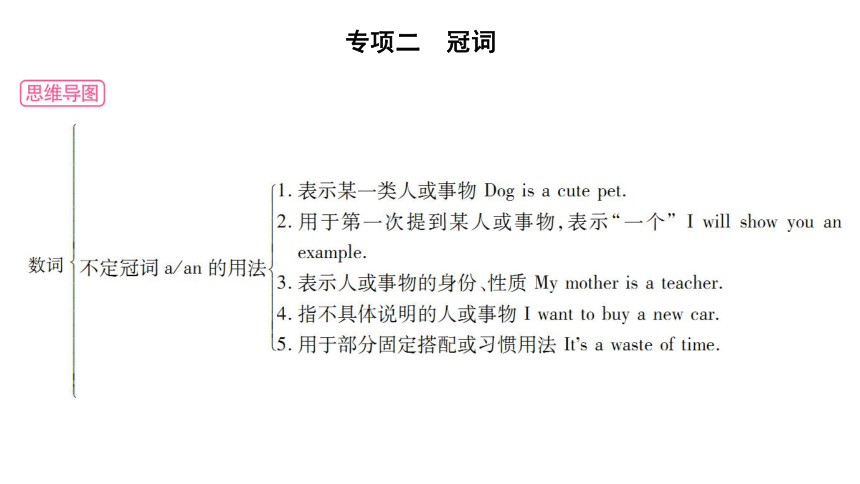 | |
| 格式 | zip | ||
| 文件大小 | 473.1KB | ||
| 资源类型 | 教案 | ||
| 版本资源 | 人教新目标(Go for it)版 | ||
| 科目 | 英语 | ||
| 更新时间 | 2023-03-23 20:42:38 | ||
图片预览

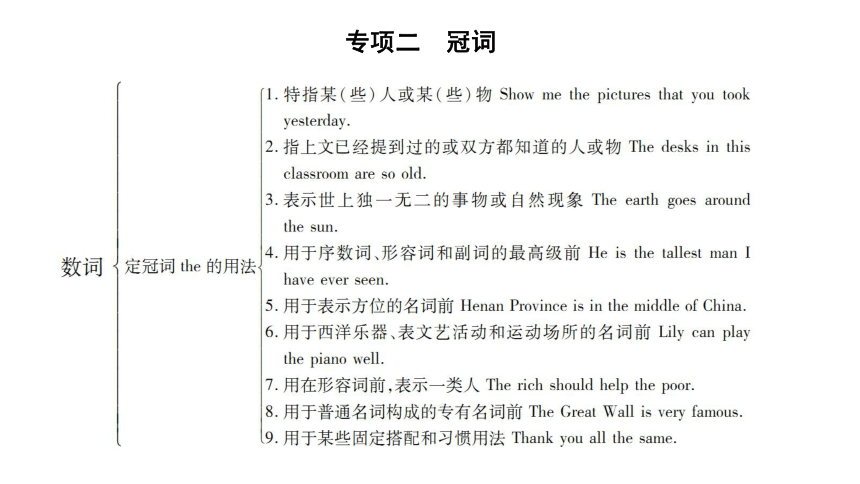
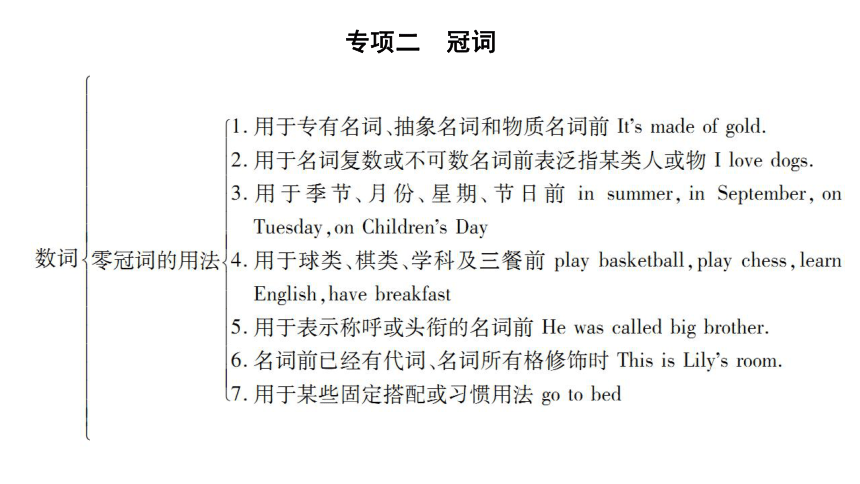
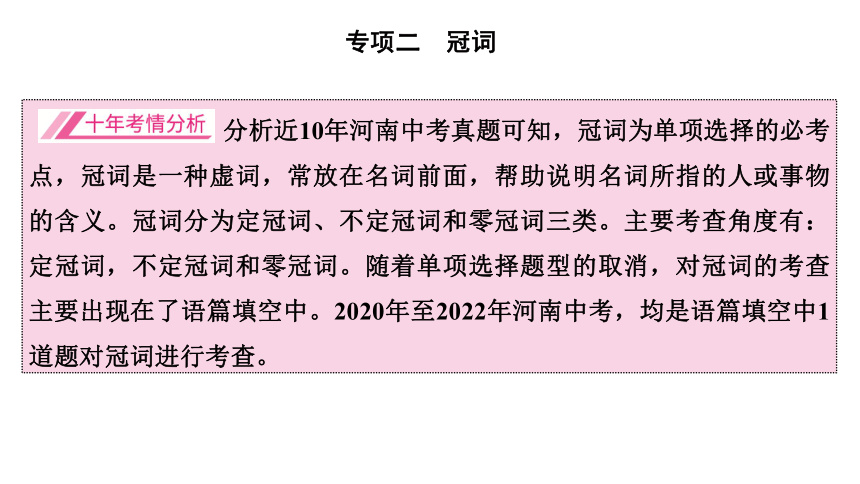
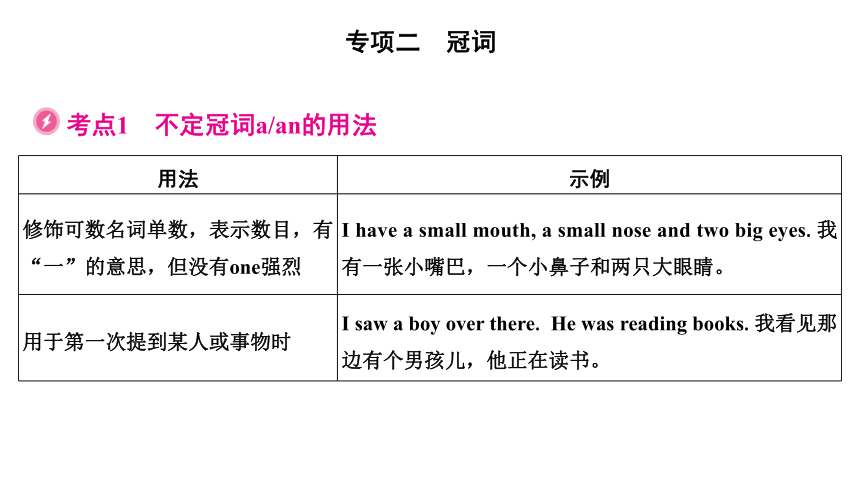
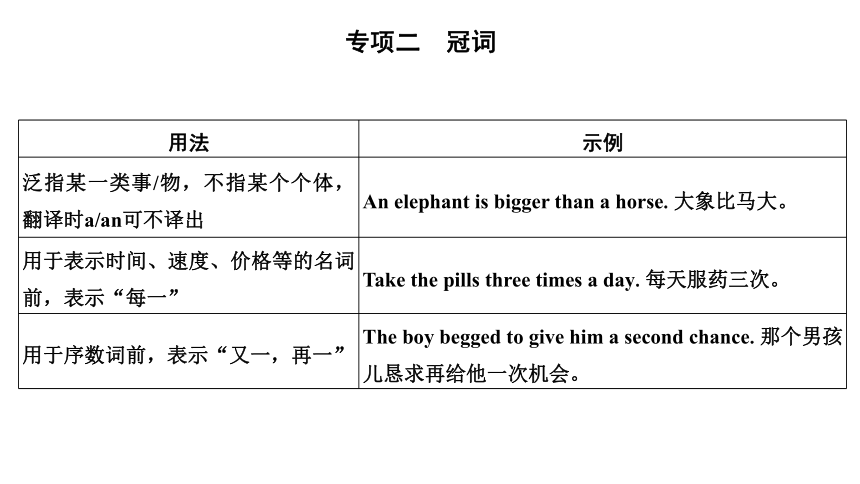
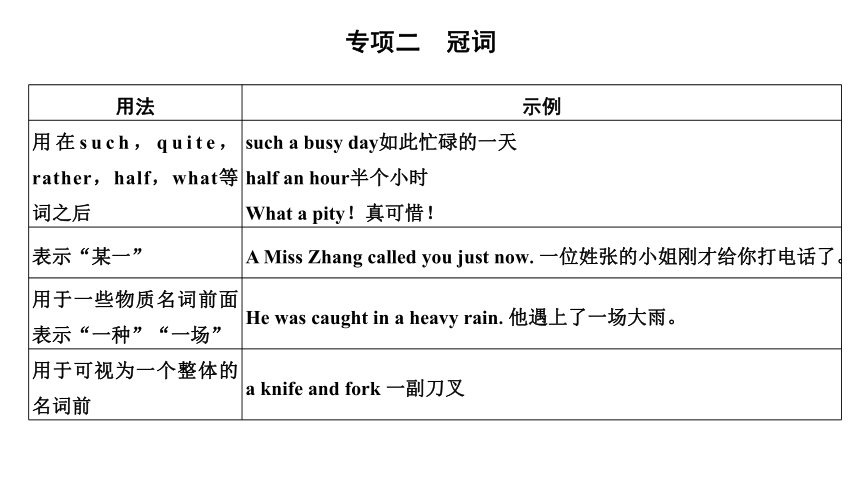
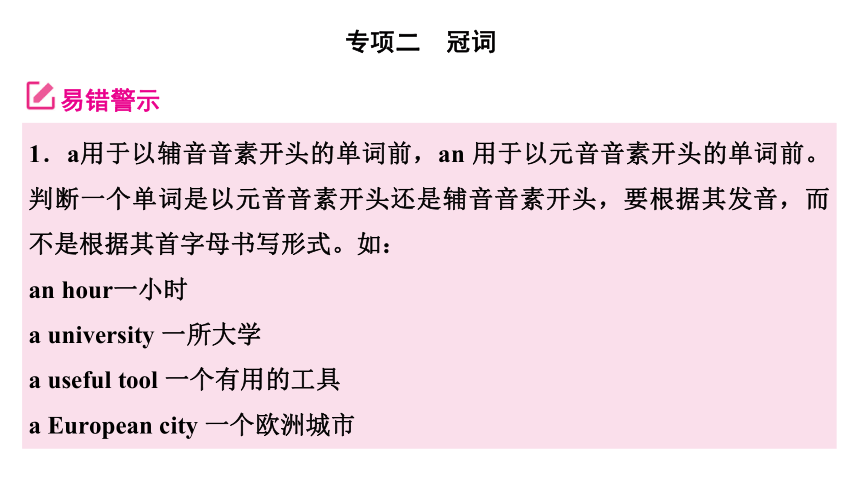
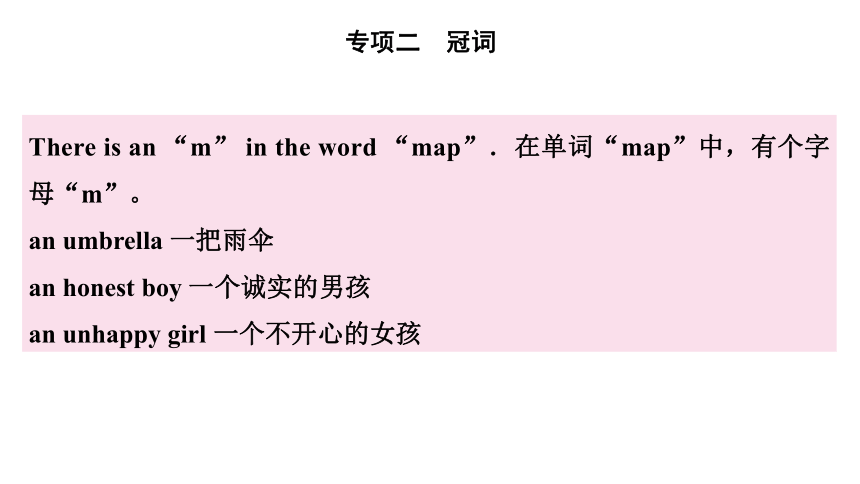
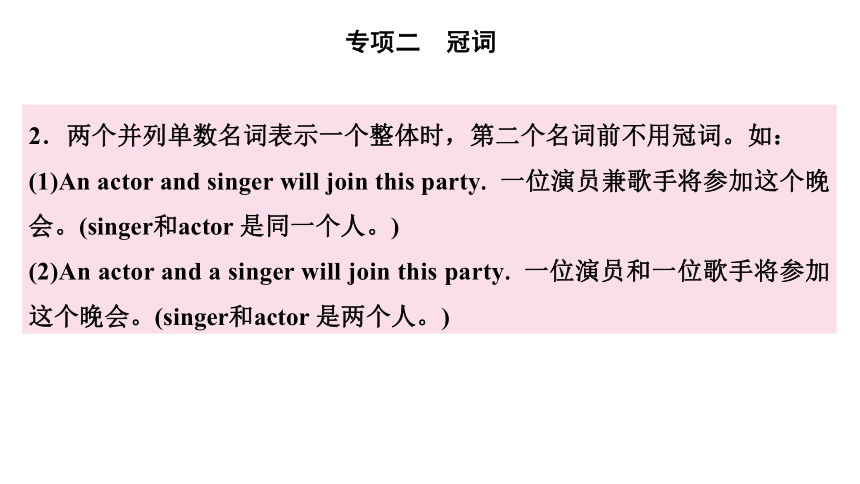
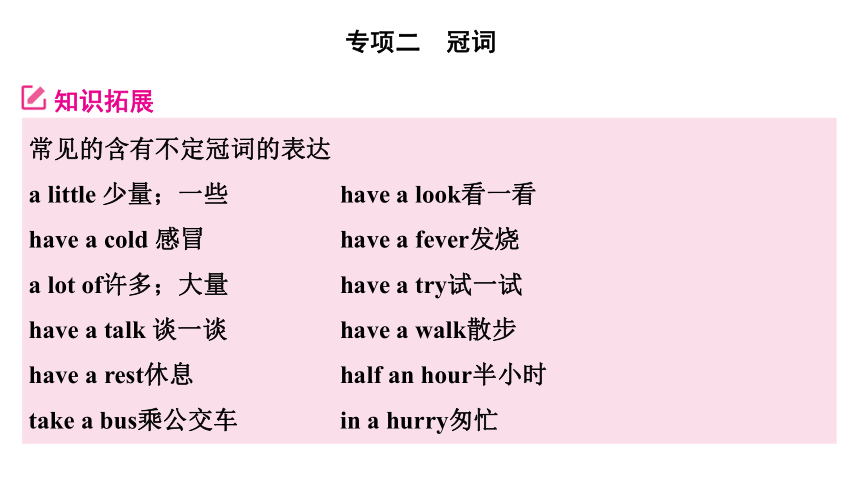
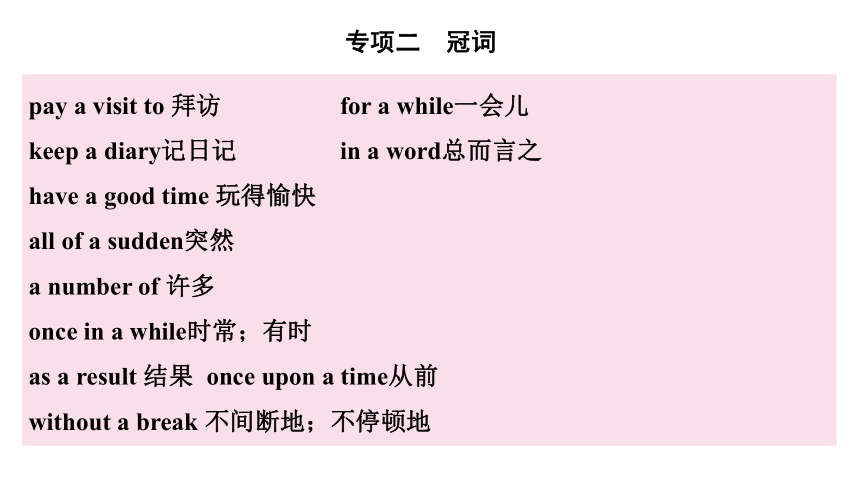
文档简介
(共36张PPT)
分析近10年河南中考真题可知,冠词为单项选择的必考点,冠词是一种虚词,常放在名词前面,帮助说明名词所指的人或事物的含义。冠词分为定冠词、不定冠词和零冠词三类。主要考查角度有:定冠词,不定冠词和零冠词。随着单项选择题型的取消,对冠词的考查主要出现在了语篇填空中。2020年至2022年河南中考,均是语篇填空中1道题对冠词进行考查。
考点1 不定冠词a/an的用法
用法 示例
修饰可数名词单数,表示数目,有“一”的意思,但没有one强烈 I have a small mouth, a small nose and two big eyes.我有一张小嘴巴,一个小鼻子和两只大眼睛。
用于第一次提到某人或事物时 I saw a boy over there. He was reading books.我看见那边有个男孩儿,他正在读书。
用法 示例
泛指某一类事/物,不指某个个体,翻译时a/an可不译出 An elephant is bigger than a horse.大象比马大。
用于表示时间、速度、价格等的名词前,表示“每一” Take the pills three times a day.每天服药三次。
用于序数词前,表示“又一,再一” The boy begged to give him a second chance.那个男孩儿恳求再给他一次机会。
用法 示例
用在such,quite,rather,half,what等词之后 such a busy day如此忙碌的一天
half an hour半个小时
What a pity!真可惜!
表示“某一” A Miss Zhang called you just now.一位姓张的小姐刚才给你打电话了。
用于一些物质名词前面表示“一种”“一场” He was caught in a heavy rain.他遇上了一场大雨。
用于可视为一个整体的名词前 a knife and fork 一副刀叉
1.a用于以辅音音素开头的单词前,an 用于以元音音素开头的单词前。判断一个单词是以元音音素开头还是辅音音素开头,要根据其发音,而不是根据其首字母书写形式。如:
an hour一小时
a university 一所大学
a useful tool 一个有用的工具
a European city 一个欧洲城市
易错警示
There is an “m” in the word “map”.在单词“map”中,有个字母“m”。
an umbrella 一把雨伞
an honest boy 一个诚实的男孩
an unhappy girl 一个不开心的女孩
2.两个并列单数名词表示一个整体时,第二个名词前不用冠词。如:
(1)An actor and singer will join this party. 一位演员兼歌手将参加这个晚会。(singer和actor 是同一个人。)
(2)An actor and a singer will join this party. 一位演员和一位歌手将参加这个晚会。(singer和actor 是两个人。)
常见的含有不定冠词的表达
a little 少量;一些 have a look看一看
have a cold 感冒 have a fever发烧
a lot of许多;大量 have a try试一试
have a talk 谈一谈 have a walk散步
have a rest休息 half an hour半小时
take a bus乘公交车 in a hurry匆忙
知识拓展
pay a visit to 拜访 for a while一会儿
keep a diary记日记 in a word总而言之
have a good time 玩得愉快
all of a sudden突然
a number of 许多
once in a while时常;有时
as a result 结果 once upon a time从前
without a break 不间断地;不停顿地
用适当的冠词填空。
1.Kitty sometimes eats ____ orange or some grapes after lunch.
2.—Yuan Longping was ____ great scientist.
—So he was. He made great contributions to human beings.
3.—The sun shines brightly. You'd better take ______ umbrella when you go out.
—OK. It's a useful suggestions.
an
a
an
4.—Is Eric married
—Yes, and he has ____ 8-year-old daughter.
5.Paper is ____ useful invention. It was invented around 2,000 years ago by Cai Lun.
6.Tony is a kind boy and I'm very lucky to have ____ friend like him.
7.China is ____ Asian country, while France is ____ European country.
an
a
a
an
a
8.As we know, schools and families play ____ important role in teaching students about the value of working hard.
9.This is ____ useful book. I've read it for ____ hour.
10.Are you going to do it ____ second time
an
a
an
a
考点2 定冠词the 的用法
1.定冠词的用法
用法 示例
表示特指的人或事物 This is the book my mother bought yesterday.这就是我妈妈昨天买的那本书。
表示上文提到过的或谈话双方都知道的人或物 There is a desk in my bedroom. And there is a lamp on the desk.我的卧室里有张书桌,书桌上有盏台灯。
用法 示例
用于世界上独一无二的事物前(此处指天体及世界上比较具有影响力的事物) the sun太阳 the moon月亮
the earth地球
用于序数词、形容词或副词的最高级或者last,next,same等词之前,表示特指 the most important festival最重要的节日the first floor一楼
用法 示例
用于西洋乐器类名词前 play the piano弹钢琴
play the violin拉小提琴
用于某些形容词前,表示一类人或事物 the poor穷人 the rich富人
the old老人 the sick病人
用于姓氏的复数前,表示全家或夫妇两人 the Greens格林一家/格林夫妇
用法 示例
用于由普通名词构成的一些表示机构、文娱场所、商店、设施等专有名词前 the Great Wall长城
the Palace Museum故宫博物院
用于“the+比较级,the+比较级”结构中,表示“越……越……” The harder you work, the greater progress you will make.你越努力,取得的进步就会越大。
用法 示例
用于表示方位或方向的名 词前 on the left在左边
in the east在东面
比较级前加the,表示特指“两个中较……的那一个” This is the more comfortable one of the two seats.这是两个座位中比较舒服的那个。
用法 示例
用于江、河、湖、海、山脉、岛屿、杂志、报纸等专有名词前 the Changjiang River长江
the Pacific Ocean太平洋
the New York Times 《纽约时报》
用于固定搭配中 in the end最终;最后
all the time一直
all the same一样
in the past在过去
on the playground在操场上
2.常见的含有定冠词the的表达
by the way顺便问一下
in the morning/afternoon/evening在早上/下午/晚上
in the end 最后
all the time一直
all the way一路上;自始至终
in the middle of在……的中间
at the beginning of在……开始时
at the moment此刻;现在
at the same time同时
with the help of 在……的帮助下
go to the cinema 去看电影
in the way 妨碍;挡道
on the left/right 在左边/右边
at the age of在……岁时
at the top of在……的顶部
3.有定冠词和无定冠词的区别
go to school 去上学(是学生) go to the school 到学校去(不一定是学生)
at school 在上学 at the school 在学校里
in class 在课堂上(上课) in the class 在教室里(玩耍)
in bed (睡、病、躺)在床上 in the bed (某物)在床上
go to bed 就寝;上床睡觉 go to the bed 走到床边;向床边走去
in prison 在坐牢 in the prison 在监狱里(不一定是犯人)
by day 在白天 by the day 按天计算
in hospital 生病住院 in the hospital 在医院里(不一定是病人)
on earth 在世界上;究竟,到底 on the earth 在地球上
in front of 在(……外部)的前面 in the front of在(……内部)的前面
in future 今后,从此以后 in the future 未来
next year 明年 the next year 第二年
by sea 乘船 by the sea 在海边
at table 在吃饭 at the table 在桌旁
用适当的冠词填空。
11.________ elephant is much heavier than _______ horse.
12._____ sun rises in _____ east.
13.Washington is _____ capital of the USA.
14._____ day of December 20, 1999 is Monday.
The/An
the/a
The
the
the
The
15.He joined the army in _____ spring of 1995.
16.As an old saying goes, “He who has never been to _____ Great Wall is not a true man.”
17.Everyone needs to know _____ importance of rubbish sorting(分类).
18.The bridge between the two islands is _____ longest one in this area.
the
the
the
the
考点3 零冠词的用法
零冠词是指英文中某些情况下名词前不用冠词的情况。
用法 示例
三餐、球类、语言、学科、棋类等名词前 have breakfast/lunch/dinner 吃早餐/午餐/晚餐
play football踢足球
learn English 学习英语
节假日、月份、星期等专有名词前 in July在七月
on Children's Day在儿童节
on Sunday在周日
用法 示例
复数名词或不可数名词表示一类事物时 Dogs are our friends.狗是我们的朋友。
Water is important to us.水对我们来说是重要的。
人名、地名、街道名、城市名、洲、省、机场以及公园等专有名词前 Jianshe Road建设路
Baiyun Airport白云机场
与by连用的交通工具前不加冠词 by train乘火车
by plane乘飞机
用法 示例
名词前有形容词性物主代词、指示代词、名词所有格等限定词时 I can't find my English book.我找不到我的英语书了。
一人兼多个身份时,除第一个名词前加冠词外,其他名词前不用加冠词 The poet and pianist is going to give us a talk.这位诗人兼钢琴家将给我们做演讲。
某些固定搭配中不用冠词 day and night日夜不停
after school放学后
by accident偶然
at home在家
常见的省略冠词的表达
at first 首先 at least 至少
at home 在家 at times 有时;间或
at noon/night/midnight在中午/晚上/半夜
by bus乘公共汽车 by bike 骑自行车
by train乘火车 by plane/air 乘飞机
知识拓展
by mistake 错误地 in time 及时
in fact事实上 in danger 处于危险中
on time按时 on foot 步行
out of danger 脱离危险
on holiday 在度假
go to bed 上床睡觉 go to sleep 睡觉
go to school/work/university 上学/上班/上大学
1.节日前一般不加冠词,但我国的传统节日前要加the。如:
the Spring Festival春节
the Lantern Festival 元宵节
the Dragon Boat Festival端午节
the Mid-Autumn Festival中秋节
易错警示
2.一日三餐前通常不加冠词,但当特指或指具体的饮食时,可用定冠词;有形容词修饰时,用不定冠词。如:
Were you at the lunch with the math teacher?
你和数学老师共进午餐了吗?
We had a big dinner yesterday.昨天我们吃了一顿丰盛的晚餐。
用适当的冠词填空。
19._______ Turners are living at the end of _____ Turner Street.
20.Tomorrow is _____ Christmas Day and my father and I went to choose ______ Christmas tree today.
21.They went to ____ Songshan Park, but we both went to ___ Hongxing Cinema yesterday.
The
/
/
a
/
/
22.After school, I bought _____ present for my mother.
23.There is _____ bank across from the hospital.
24.I usually have ______ egg and some bread for breakfast.
25._______ Smiths went on a trip on the beach, and they had a good time last weekend.
26.This is ____ knife and fork on the table.I might be served with western food.
a
a
an
The
a
分析近10年河南中考真题可知,冠词为单项选择的必考点,冠词是一种虚词,常放在名词前面,帮助说明名词所指的人或事物的含义。冠词分为定冠词、不定冠词和零冠词三类。主要考查角度有:定冠词,不定冠词和零冠词。随着单项选择题型的取消,对冠词的考查主要出现在了语篇填空中。2020年至2022年河南中考,均是语篇填空中1道题对冠词进行考查。
考点1 不定冠词a/an的用法
用法 示例
修饰可数名词单数,表示数目,有“一”的意思,但没有one强烈 I have a small mouth, a small nose and two big eyes.我有一张小嘴巴,一个小鼻子和两只大眼睛。
用于第一次提到某人或事物时 I saw a boy over there. He was reading books.我看见那边有个男孩儿,他正在读书。
用法 示例
泛指某一类事/物,不指某个个体,翻译时a/an可不译出 An elephant is bigger than a horse.大象比马大。
用于表示时间、速度、价格等的名词前,表示“每一” Take the pills three times a day.每天服药三次。
用于序数词前,表示“又一,再一” The boy begged to give him a second chance.那个男孩儿恳求再给他一次机会。
用法 示例
用在such,quite,rather,half,what等词之后 such a busy day如此忙碌的一天
half an hour半个小时
What a pity!真可惜!
表示“某一” A Miss Zhang called you just now.一位姓张的小姐刚才给你打电话了。
用于一些物质名词前面表示“一种”“一场” He was caught in a heavy rain.他遇上了一场大雨。
用于可视为一个整体的名词前 a knife and fork 一副刀叉
1.a用于以辅音音素开头的单词前,an 用于以元音音素开头的单词前。判断一个单词是以元音音素开头还是辅音音素开头,要根据其发音,而不是根据其首字母书写形式。如:
an hour一小时
a university 一所大学
a useful tool 一个有用的工具
a European city 一个欧洲城市
易错警示
There is an “m” in the word “map”.在单词“map”中,有个字母“m”。
an umbrella 一把雨伞
an honest boy 一个诚实的男孩
an unhappy girl 一个不开心的女孩
2.两个并列单数名词表示一个整体时,第二个名词前不用冠词。如:
(1)An actor and singer will join this party. 一位演员兼歌手将参加这个晚会。(singer和actor 是同一个人。)
(2)An actor and a singer will join this party. 一位演员和一位歌手将参加这个晚会。(singer和actor 是两个人。)
常见的含有不定冠词的表达
a little 少量;一些 have a look看一看
have a cold 感冒 have a fever发烧
a lot of许多;大量 have a try试一试
have a talk 谈一谈 have a walk散步
have a rest休息 half an hour半小时
take a bus乘公交车 in a hurry匆忙
知识拓展
pay a visit to 拜访 for a while一会儿
keep a diary记日记 in a word总而言之
have a good time 玩得愉快
all of a sudden突然
a number of 许多
once in a while时常;有时
as a result 结果 once upon a time从前
without a break 不间断地;不停顿地
用适当的冠词填空。
1.Kitty sometimes eats ____ orange or some grapes after lunch.
2.—Yuan Longping was ____ great scientist.
—So he was. He made great contributions to human beings.
3.—The sun shines brightly. You'd better take ______ umbrella when you go out.
—OK. It's a useful suggestions.
an
a
an
4.—Is Eric married
—Yes, and he has ____ 8-year-old daughter.
5.Paper is ____ useful invention. It was invented around 2,000 years ago by Cai Lun.
6.Tony is a kind boy and I'm very lucky to have ____ friend like him.
7.China is ____ Asian country, while France is ____ European country.
an
a
a
an
a
8.As we know, schools and families play ____ important role in teaching students about the value of working hard.
9.This is ____ useful book. I've read it for ____ hour.
10.Are you going to do it ____ second time
an
a
an
a
考点2 定冠词the 的用法
1.定冠词的用法
用法 示例
表示特指的人或事物 This is the book my mother bought yesterday.这就是我妈妈昨天买的那本书。
表示上文提到过的或谈话双方都知道的人或物 There is a desk in my bedroom. And there is a lamp on the desk.我的卧室里有张书桌,书桌上有盏台灯。
用法 示例
用于世界上独一无二的事物前(此处指天体及世界上比较具有影响力的事物) the sun太阳 the moon月亮
the earth地球
用于序数词、形容词或副词的最高级或者last,next,same等词之前,表示特指 the most important festival最重要的节日the first floor一楼
用法 示例
用于西洋乐器类名词前 play the piano弹钢琴
play the violin拉小提琴
用于某些形容词前,表示一类人或事物 the poor穷人 the rich富人
the old老人 the sick病人
用于姓氏的复数前,表示全家或夫妇两人 the Greens格林一家/格林夫妇
用法 示例
用于由普通名词构成的一些表示机构、文娱场所、商店、设施等专有名词前 the Great Wall长城
the Palace Museum故宫博物院
用于“the+比较级,the+比较级”结构中,表示“越……越……” The harder you work, the greater progress you will make.你越努力,取得的进步就会越大。
用法 示例
用于表示方位或方向的名 词前 on the left在左边
in the east在东面
比较级前加the,表示特指“两个中较……的那一个” This is the more comfortable one of the two seats.这是两个座位中比较舒服的那个。
用法 示例
用于江、河、湖、海、山脉、岛屿、杂志、报纸等专有名词前 the Changjiang River长江
the Pacific Ocean太平洋
the New York Times 《纽约时报》
用于固定搭配中 in the end最终;最后
all the time一直
all the same一样
in the past在过去
on the playground在操场上
2.常见的含有定冠词the的表达
by the way顺便问一下
in the morning/afternoon/evening在早上/下午/晚上
in the end 最后
all the time一直
all the way一路上;自始至终
in the middle of在……的中间
at the beginning of在……开始时
at the moment此刻;现在
at the same time同时
with the help of 在……的帮助下
go to the cinema 去看电影
in the way 妨碍;挡道
on the left/right 在左边/右边
at the age of在……岁时
at the top of在……的顶部
3.有定冠词和无定冠词的区别
go to school 去上学(是学生) go to the school 到学校去(不一定是学生)
at school 在上学 at the school 在学校里
in class 在课堂上(上课) in the class 在教室里(玩耍)
in bed (睡、病、躺)在床上 in the bed (某物)在床上
go to bed 就寝;上床睡觉 go to the bed 走到床边;向床边走去
in prison 在坐牢 in the prison 在监狱里(不一定是犯人)
by day 在白天 by the day 按天计算
in hospital 生病住院 in the hospital 在医院里(不一定是病人)
on earth 在世界上;究竟,到底 on the earth 在地球上
in front of 在(……外部)的前面 in the front of在(……内部)的前面
in future 今后,从此以后 in the future 未来
next year 明年 the next year 第二年
by sea 乘船 by the sea 在海边
at table 在吃饭 at the table 在桌旁
用适当的冠词填空。
11.________ elephant is much heavier than _______ horse.
12._____ sun rises in _____ east.
13.Washington is _____ capital of the USA.
14._____ day of December 20, 1999 is Monday.
The/An
the/a
The
the
the
The
15.He joined the army in _____ spring of 1995.
16.As an old saying goes, “He who has never been to _____ Great Wall is not a true man.”
17.Everyone needs to know _____ importance of rubbish sorting(分类).
18.The bridge between the two islands is _____ longest one in this area.
the
the
the
the
考点3 零冠词的用法
零冠词是指英文中某些情况下名词前不用冠词的情况。
用法 示例
三餐、球类、语言、学科、棋类等名词前 have breakfast/lunch/dinner 吃早餐/午餐/晚餐
play football踢足球
learn English 学习英语
节假日、月份、星期等专有名词前 in July在七月
on Children's Day在儿童节
on Sunday在周日
用法 示例
复数名词或不可数名词表示一类事物时 Dogs are our friends.狗是我们的朋友。
Water is important to us.水对我们来说是重要的。
人名、地名、街道名、城市名、洲、省、机场以及公园等专有名词前 Jianshe Road建设路
Baiyun Airport白云机场
与by连用的交通工具前不加冠词 by train乘火车
by plane乘飞机
用法 示例
名词前有形容词性物主代词、指示代词、名词所有格等限定词时 I can't find my English book.我找不到我的英语书了。
一人兼多个身份时,除第一个名词前加冠词外,其他名词前不用加冠词 The poet and pianist is going to give us a talk.这位诗人兼钢琴家将给我们做演讲。
某些固定搭配中不用冠词 day and night日夜不停
after school放学后
by accident偶然
at home在家
常见的省略冠词的表达
at first 首先 at least 至少
at home 在家 at times 有时;间或
at noon/night/midnight在中午/晚上/半夜
by bus乘公共汽车 by bike 骑自行车
by train乘火车 by plane/air 乘飞机
知识拓展
by mistake 错误地 in time 及时
in fact事实上 in danger 处于危险中
on time按时 on foot 步行
out of danger 脱离危险
on holiday 在度假
go to bed 上床睡觉 go to sleep 睡觉
go to school/work/university 上学/上班/上大学
1.节日前一般不加冠词,但我国的传统节日前要加the。如:
the Spring Festival春节
the Lantern Festival 元宵节
the Dragon Boat Festival端午节
the Mid-Autumn Festival中秋节
易错警示
2.一日三餐前通常不加冠词,但当特指或指具体的饮食时,可用定冠词;有形容词修饰时,用不定冠词。如:
Were you at the lunch with the math teacher?
你和数学老师共进午餐了吗?
We had a big dinner yesterday.昨天我们吃了一顿丰盛的晚餐。
用适当的冠词填空。
19._______ Turners are living at the end of _____ Turner Street.
20.Tomorrow is _____ Christmas Day and my father and I went to choose ______ Christmas tree today.
21.They went to ____ Songshan Park, but we both went to ___ Hongxing Cinema yesterday.
The
/
/
a
/
/
22.After school, I bought _____ present for my mother.
23.There is _____ bank across from the hospital.
24.I usually have ______ egg and some bread for breakfast.
25._______ Smiths went on a trip on the beach, and they had a good time last weekend.
26.This is ____ knife and fork on the table.I might be served with western food.
a
a
an
The
a
同课章节目录
- 词法
- 名词
- 动词和动词短语
- 动词语态
- 动词时态
- 助动词和情态动词
- 非谓语动词
- 冠词
- 代词
- 数词和量词
- 形容词副词及其比较等级
- 介词和介词短语
- 连词和感叹词
- 构词法
- 相似、相近词比较
- 句法
- 陈述句
- 一般疑问句和否定疑问句
- 特殊疑问句及选择疑问句
- 反意疑问句
- 存在句(There be句型)
- 宾语从句
- 定语从句
- 状语从句
- 主谓一致问题
- 简单句
- 并列句
- 复合句
- 主谓一致
- 主、表语从句
- 名词性从句
- 直接引语和间接引语
- 虚拟语气
- 感叹句
- 强调句
- 倒装句
- 祈使句
- 句子的成分
- 句子的分类
- 题型专区
- 单项选择部分
- 易错题
- 完形填空
- 阅读理解
- 词汇练习
- 听说训练
- 句型转换
- 补全对话
- 短文改错
- 翻译
- 书面表达
- 任务型阅读
- 语法填空
- 其他资料
